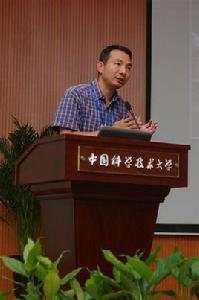人物簡介
美國University of California, Irvine生物物理學博士/上海交通大學MED-X研究院、生物醫學工程學院特聘教授
人物生平
 魏勛斌
魏勛斌長期從事生物醫學光子學的研究與套用,已發表30餘篇高質量學術論文(包括Nature, PNAS)和取得研究專利結果7項。主要研究方面有: 1)生物醫學光學影像技術及其在癌症擴散和幹細胞方面的研究。實驗室正在建設的一種新的生物醫學光學儀器“活體流式細胞儀”, 將無須抽血即可實時檢測活體小動物(如實驗用的老鼠)循環系統內某個(某些)細胞群體(如CD4+白細胞)的存在並可以進行定量分析與監測,適用於實驗室對癌症細胞的擴散研究、藥物的早期篩選、血細胞和白細胞的免疫分析等; 2)雷射生物醫學光子學在醫學臨床上的研究和實際套用,如無創檢測皮膚疾病和治療,老年痴呆症和帕金森症的早期光學診斷和早期治療等;3)運用活體的光學分子影像技術及新的納米技術進行藥物吸收(Drug Delivery)的研究。
代表論文
Wang L, Fan Z, Zhang J, Changyi Y, Huang C, Gu Y, Xu Z, Tang Z, Lu W, Wei X, Li C.Evaluating tumor metastatic potential by imaging intratumoral acidosis via pH-activatable near-infrared fluorescent probe. Int J Cancer. 2014 Epub. (corresponding author; impact factor: 6.2)
Zhang Y, Cai W, Huang Q, Gu Y, Shi Y, Huang J, Zhao F, Liu Q, Wei X, Jin M, Wu C, Xie Q, Zhang Y, Wan B, Zhang Y. Mesenchymal stem cells alleviate bacteria-induced liver injury in mice by inducing regulatory dendritic cells. Hepatology. 2014, 59(2):671-82. (impact factor: 11.19)
Zhong MC, Wei XB, Zhou JH, Wang ZQ, Li YM. Trapping red blood cells in living animals using optical tweezers. Nat Commun. 2013,4:1768. (corresponding author; impact factor: 10.7)
Liao Y, Cheng Y, Liu C, Song J, He F, Shen Y, Chen D, Xu Z, Fan Z, Wei X, Sugioka K, Midorikawa K. Direct laser writing of sub-50 nm nanofluidic channels buried in glass for three-dimensional micro-nanofluidic integration. Lab Chip. 2013, 13(8):1626-31. (impact factor: 5.8)
Fan ZC, Yan J, Liu GD, Tan XY, Weng XF, Wu WZ, Zhou J, Wei XB. Real-time monitoring of rare circulating hepatocellular carcinoma cells in an orthotopic model by in vivo flow cytometry assesses resection on metastasis. Cancer Res. 2012, 72(10):2683-91. (corresponding author; impact factor: 9.3)
Wang L, Zhu X, Xie C, Ding N, Weng X, Lu W, Wei X, Li C. Imaging acidosis in tumors using a pH-activated near-infrared fluorescence probe. Chem Commun (Camb). 2012, 11;48(95):11677-9. (corresponding author; impact factor: 6.7)
Yan H, Wang L, Wang J, Weng X, Lei H, Wang X, Jiang L, Zhu J, Lu W, Wei X, Li C. Two-order targeted brain tumor imaging by using an optical/paramagnetic nanoprobe across the blood brain barrier. ACS Nano. 2012, 24;6(1):410-20. (corresponding author; impact factor: 12.0)
Hu L, Fan Z, Du H, Ni R, Zhang S, Yin K, Ye J, Zhang Y, Wei X, Zhang X, Gross PL, Kunapuli SP, Ding Z. BF061, a novel antiplatelet and antithrombotic agent targeting P2Y₁₂ receptor and phosphodiesterase. Thromb Haemost. 2011, 106(6):1203-14. (impact factor: 5.8)
Li C, Li K, Yan H, Li G, Xia J, Wei X. Dextran based pH-activated near-infrared fluorescence nanoprobe imaging the acidic compartments in cancer cells. Chem Commun (Camb). 2010, 46(8):1326-8. (corresponding author; impact factor: 6.7)
Sipkins DA, Wei X, Wu JW, Runnels JM, Cote D, Means TK, Luster AD, Scadden DT, Lin CP. In vivo imaging of specialized bone marrow endothelial microdomains for tumor engraftment. Nature. 2005, 435:969-73. (impact factor: 42.4).
Georgakoudi I, Solban N, Novak J, Rice, W, Wei X, Hasan, T, Lin CP. In vivo flow cytometry: A new method for enumerating circulating cancer cells. Cancer Research. 2004, 64:5044-7 (impact factor: 9.3).
Kunstfeld R, Hirakawa S, Hong YK, Lin, CP, Wei X, Bohlen P, Detmar. Induction of cutaneous delayed-type hypersensitivity reactions in VEGF-A transgenic mice results in chronic skin inflammation associated with persistent lymphatic hyperplasia. Blood. 2004, 104:1048-57 (impact factor: 9.8).
Wei X, Tromberg BJ, Cahalan MD. Mapping the sensitivity of T cells with an optical trap: polarity and minimal number of receptors for Ca(2+) signaling. Proc Natl Acad Sci U S A. 1999, 96(15):8471-6.(impact factor: 9.8).
1.Wang L, Fan Z, Zhang J, Changyi Y, Huang C, Gu Y, Xu Z, Tang Z, Lu W, Wei X, Li C.Evaluating tumor metastatic potential by imaging intratumoral acidosis via pH-activatable near-infrared fluorescent probe. Int J Cancer. 2014 Epub. (corresponding author; impact factor: 6.2)
2.Zhang Y, Cai W, Huang Q, Gu Y, Shi Y, Huang J, Zhao F, Liu Q, Wei X, Jin M, Wu C, Xie Q, Zhang Y, Wan B, Zhang Y. Mesenchymal stem cells alleviate bacteria-induced liver injury in mice by inducing regulatory dendritic cells. Hepatology. 2014, 59(2):671-82. (impact factor: 11.19)
3.Zhong MC, Wei XB, Zhou JH, Wang ZQ, Li YM. Trapping red blood cells in living animals using optical tweezers. Nat Commun. 2013,4:1768. (corresponding author; impact factor: 10.7)
4.Liao Y, Cheng Y, Liu C, Song J, He F, Shen Y, Chen D, Xu Z, Fan Z, Wei X, Sugioka K, Midorikawa K. Direct laser writing of sub-50 nm nanofluidic channels buried in glass for three-dimensional micro-nanofluidic integration. Lab Chip. 2013, 13(8):1626-31. (impact factor: 5.8)
5.Fan ZC, Yan J, Liu GD, Tan XY, Weng XF, Wu WZ, Zhou J, Wei XB. Real-time monitoring of rare circulating hepatocellular carcinoma cells in an orthotopic model by in vivo flow cytometry assesses resection on metastasis. Cancer Res. 2012, 72(10):2683-91. (corresponding author; impact factor: 9.3)
6.Wang L, Zhu X, Xie C, Ding N, Weng X, Lu W, Wei X, Li C. Imaging acidosis in tumors using a pH-activated near-infrared fluorescence probe. Chem Commun (Camb). 2012, 11;48(95):11677-9. (corresponding author; impact factor: 6.7)
7.Yan H, Wang L, Wang J, Weng X, Lei H, Wang X, Jiang L, Zhu J, Lu W, Wei X, Li C. Two-order targeted brain tumor imaging by using an optical/paramagnetic nanoprobe across the blood brain barrier. ACS Nano. 2012, 24;6(1):410-20. (corresponding author; impact factor: 12.0)
8.Hu L, Fan Z, Du H, Ni R, Zhang S, Yin K, Ye J, Zhang Y, Wei X, Zhang X, Gross PL, Kunapuli SP, Ding Z. BF061, a novel antiplatelet and antithrombotic agent targeting P2Y₁₂ receptor and phosphodiesterase. Thromb Haemost. 2011, 106(6):1203-14. (impact factor: 5.8)
9.Li C, Li K, Yan H, Li G, Xia J, Wei X. Dextran based pH-activated near-infrared fluorescence nanoprobe imaging the acidic compartments in cancer cells. Chem Commun (Camb). 2010, 46(8):1326-8. (corresponding author; impact factor: 6.7)
10.Sipkins DA, Wei X, Wu JW, Runnels JM, Cote D, Means TK, Luster AD, Scadden DT, Lin CP. In vivo imaging of specialized bone marrow endothelial microdomains for tumor engraftment. Nature. 2005, 435:969-73. (impact factor: 42.4).
11.Georgakoudi I, Solban N, Novak J, Rice, W, Wei X, Hasan, T, Lin CP. In vivo flow cytometry: A new method for enumerating circulating cancer cells. Cancer Research. 2004, 64:5044-7 (impact factor: 9.3).
12.Kunstfeld R, Hirakawa S, Hong YK, Lin, CP, Wei X, Bohlen P, Detmar. Induction of cutaneous delayed-type hypersensitivity reactions in VEGF-A transgenic mice results in chronic skin inflammation associated with persistent lymphatic hyperplasia. Blood. 2004, 104:1048-57 (impact factor: 9.8).
13.Wei X, Tromberg BJ, Cahalan MD. Mapping the sensitivity of T cells with an optical trap: polarity and minimal number of receptors for Ca(2+) signaling. Proc Natl Acad Sci U S A. 1999, 96(15):8471-6.(impact factor: 9.8).


